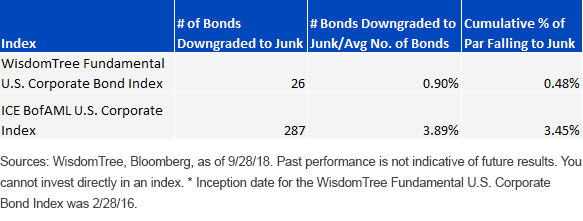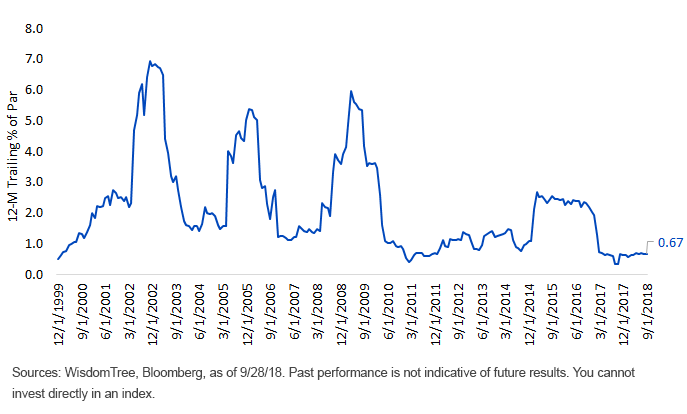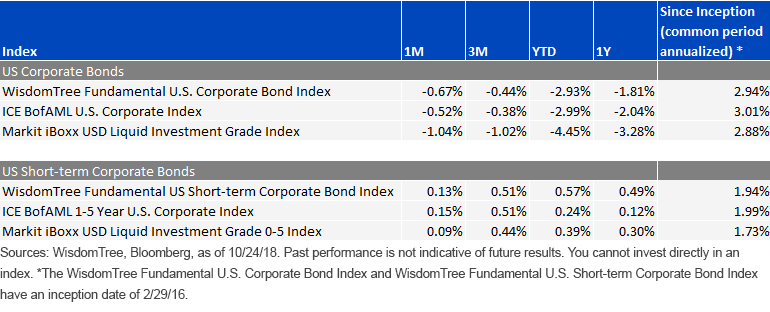Tracking Downgrades across Investment-Grade Corporates



With the debt of numerous high-profile, blue-chip corporations (most recently, Ford) being placed on negative watch, investors are taking another look at credit quality across the U.S. investment-grade corporate debt universe. Additionally, many investors are starting to take note of the increasing concentration in issues rated BBB (the lower end of the investment-grade spectrum). While the benign credit environment of recent years may be softening, we believe domestic economic strength will continue to support corporate profitability and solvency in quality companies. However, companies with weaker fundamentals could be more vulnerable to downgrades as rates rise. In our view, prudent investors should start to assess whether the underlying credit risks in their portfolios are worth taking.
Contrasting Our Approach to Credit
To address these concerns about issuer fundamentals, the WisdomTree Fundamental U.S. Corporate Bond Index (WFCIG) was designed to provide an alternative to blindly allocating across the credit spectrum. It offers an intuitive approach to identifying debt issues with quality fundamentals and attractive income profiles—case in point, WFCIG does not currently hold any issues of Ford Motor Company.1
A key difference between WFCIG and the ICE BofAML U.S. Corporate Index is that fewer bonds in WFCIG have been downgraded to non-investment-grade or junk status. When companies lose their investment-grade rating, many managers may be forced to sell these positions, according to their investment policy statements. As a result, these bonds often underperform in the short run after being downgraded.
Fallen Angels in U.S. Corporate Bond Indices
*2/28/16–9/28/18

The table above shows that, of all the bonds held since WFCIG’s inception, only 0.90% have fallen into junk status. By comparison, in the broad market, 3.89% of bonds have been downgraded to junk. In terms of par amount, 0.48% of WFCIG has fallen to junk, while the broad market has seen 3.45% fall to junk. The results suggest that the Index has performed as intended.
Putting Current Credit Conditions in Context
In the chart below, we plot the rolling 12-month percentage of the U.S. investment-grade corporate bond market which has been downgraded to non-investment grade status.
Rolling 12-M Fallen Angels as a Percentage of Par within the ICE BofAML U.S. Corporate Index

As of the end of September 2018, only 0.67% of the investment-grade index was downgraded to junk status over the trailing 12 months. Put another way, this period ranks in the 90th percentile among the most benign periods in the last 20 years. In our view, should the current trend begin to normalize, the WisdomTree Fundamental U.S. Corporate Bond Index could provide a defensive stance to better weather the performance impact of bonds falling to junk. Next, we compare the impact these developments have had on index returns.
Performance Summary as of 10/24/18

Since inception in February 2016, the WisdomTree Fundamental U.S. Corporate Bond Indexes are neck and neck with market-cap-based approaches. Similarly, over the past year, the WisdomTree Fundamental Indexes have performed in line with the broadest representation of the U.S. investment-grade bond market, the ICE BofAML U.S. Corporate Index. However, compared to a more concentrated index, our fundamental approaches are outperforming by a considerable margin. In fact, the WisdomTree Fundamental U.S. Corporate Bond Index has outperformed the iBoxx USD Liquid Investment Grade Index by 1.47%.
Conclusion
While our base case is that the current credit cycle remains benign for the next two years, we believe the time to begin dialing down exposure could be upon us. By relying on strategies that focus on fundamentals, investors may be able to avoid some of the potential pitfalls inherent in credit-based investing.
1Holdings subject to change. For current holdings of the WisdomTree Fundamental U.S. Corporate Bond Index click here.



